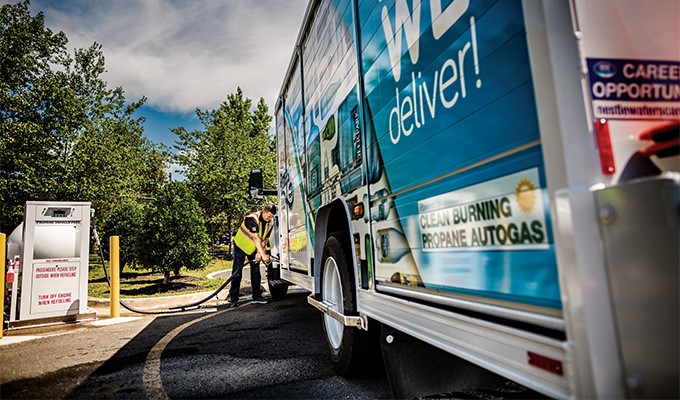A new comparative analysis analyzes the carbon footprint of medium-duty and heavy-duty (MD-HD) engine vehicles powered by propane and electricity. The analysis, Decarbonization of MD-HD Vehicles with Propane, found that propane-fueled MD-HD internal combustion engine vehicles provide a lower carbon footprint solution in 38 US states and Washington, DC, when compared to MD-HD electric vehicles (EVs) charged using the electrical grid.
Fifteen states and Washington, DC, proposed full electrification of MD-HD trucks by 2050 targeting 30% “zero-emission” vehicle sales by 2030. The basis of the rationale behind the proposals is the assumption that the electrical grid will be fully decarbonized by then. Likewise, policy based on exhaust carbon dioxide (CO2eq) emissions alone as opposed to life-cycle analysis results misses the full picture. As a result, policy proposals today conflate the promise of electrification with actual decarbonization.
LOWER CARBON FOOTPRINT
The comparative analysis also reveals that renewable propane-powered MD-HD vehicles provide a lower carbon footprint solution in every US state except Vermont where Canadian hydroelectric power plants generate electricity. Renewable propane derives from sources such as beef fats, vegetable oils, grease residue, and other biomass feedstocks.
Moreover, the analysis shows that adopting propane as the fuel of choice for MD-HD vehicles can accelerate decarbonization. A life-cycle analysis of equivalent CO2eq emissions between electric and propane-fueled vehicles across the US supports the conclusion. The analysis uses CARB carbon intensity values along with a powertrain efficiency analysis.
“It’s often assumed that full electrification of all sectors will lead to their full decarbonization, but little thought on how electricity is currently generated, stored, transmitted, and consumed has been considered,” says the author Dr. Gokul Vishwanathan, director of research and sustainability at the Propane Education & Research Council. “While a fully renewable-based electric grid is not feasible anytime soon, propane is an effective solution today for accelerating decarbonization of transportation and other energy sectors.”
The comparative analysis presented the following decarbonization recommendations:
- All 50 states should aggressively invest resources in incentivizing renewable fuels.
- Government agencies, particularly the Department of Energy, should invest in various pathways for alternative fuel production to ensure supply.
- The US should aggressively pursue immediately available decarbonization efforts using alternative fuels rather than wait on grid infrastructure improvements.
Find out more, visit www.propane.com.




